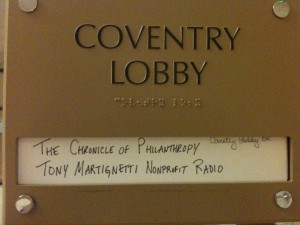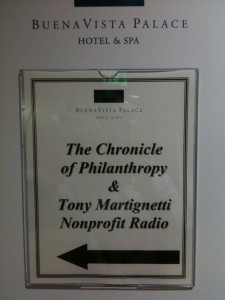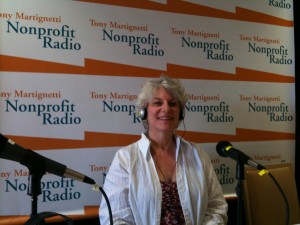 I’m blogging from the National Conference on Philanthropic Planning. Raymund Flandez from The Chronicle of Philanthropy is here and we partnered to talk to Kathryn Miree about her upcoming seminar, Endowments In Crisis! Best Practices for Nonprofit Management to Avoid the Abyss.
I’m blogging from the National Conference on Philanthropic Planning. Raymund Flandez from The Chronicle of Philanthropy is here and we partnered to talk to Kathryn Miree about her upcoming seminar, Endowments In Crisis! Best Practices for Nonprofit Management to Avoid the Abyss.
Crisis and abyss. Sounds ominous.
She distinguished for us between true and quasi-endowment. The former is when a donor demands in writing that her gift be restricted to a particular purpose in perpetuity. Quasi-endowment refers to a bequest or other unrestricted transfer where the nonprofit board restricts the use of the gift. The organization’s board is free to lift the restriction down the road.
I subjected Kathryn to a short stint in Jargon Jail when she introduced UMIFA and UPMIFA: Uniform Management (and Uniform Prudent Management) of Institutional Funds Act. You’ll have to listen to our interview on The Chronicle of Philanthropy website or Tony Martignetti Nonprofit Radio to get the details of these laws and how they impact your nonprofit.

- strong document retention practices (not merely a written policy) to preserve donors’ written instructions
- accounting methods that closely track your restricted funds’ earnings, additions, expenses
- standards for the board to set and release quasi-endowments
- trustees should not act as investment managers; even if they’re unpaid, you risk proper oversight, which is conducted by fellow trustees
If you’re at the conference you can hear Kathryn in-person at 9AM Thursday. Thank you for sitting for an interview, Kathryn!
Raymund, a pleasure to work with you.
These interviews have me looking forward to my next remote podcast day, at NextGen:Charity in NYC on November 18 and 19. I’ll do podcast interviews on Thursday, 11/18. I’ll run over to Bernstein Global Wealth Management for a lunch program at their midtown office. Then on Friday the 19th, I deliver a workshop at NextGen from 11 to 1.
More live tweeting and blogging and podcast interviews tomorrow. (That sentence has 3 words that didn’t exist just 4 or 5 years ago. I feel so 2173.)

